List of English words of Sanskrit origin – Part 3 of Part 7 | English words originated (derived) from Sanskrit | List of English words taken from Sanskrit | List of English corrupted words taken from Sanskrit
Namaste friends, how are you doing today? Welcome to #BhagavanBhakthi website / blog.
Bhagavan Lord Sri Krishna (Vishnu) (Rama) blessings to you and your family!
In this website / blog, you will always learn about #Hinduism #Sanskrit language.
Also subscribe to my YouTube channel from this link #BhagavanBhakthi to view videos about #Hinduism #Sanskrit language.
Just before going to “List of English words of Sanskrit origin – Part 3 of Part 7 | English words originated (derived) from Sanskrit | List of English words taken from Sanskrit | List of English corrupted words taken from Sanskrit“, let us know a brief, basic and very important information.
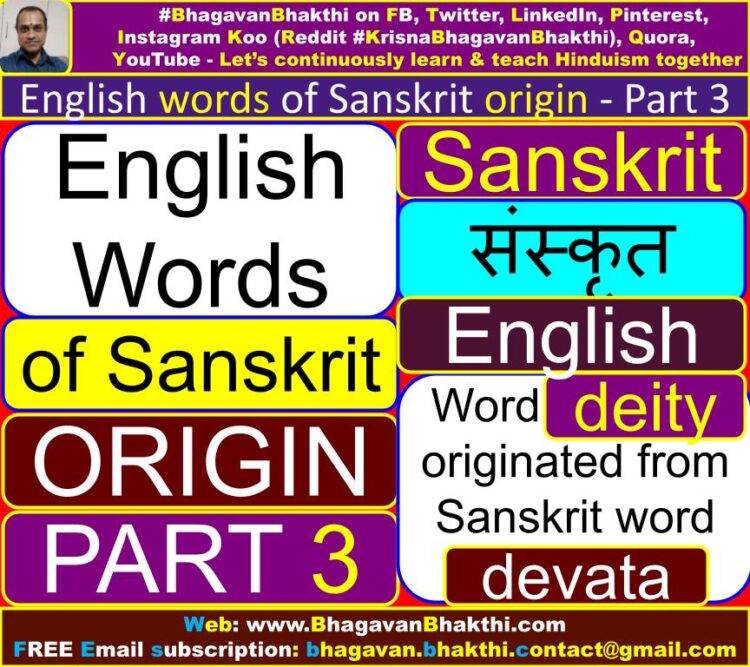
In post your will know about these : List of English words of Sanskrit origin, List of English words derived from Sanskrit, List of English words taken from Sanskrit, List of English corrupted words taken from Sanskrit, etc.
List of English words of Sanskrit origin (Part 3 of Part 7) are as given below:
Measure : Measure is originated from the Sanskrit words māpana and mātra. Translations (quantity etc. compared to a standard) French: mesure German: Maß Italian: misura Portuguese: medida Russian: мера Spanish: medida.
Deity : In Sanskrit there is a word called ‘Devata / Devta’. From this word Devata the English deity came into existence. Translations (essential nature of a god, divinity) French: déité, divinité German: Gottheit Italian: divinità, deità Portuguese: divindade, deidade Russian: божественность Spanish: deidad, divinidad.
Water : Sanskrit Varuna / Varun word is the original English word for water. Translations (clear liquid H₂O) German: Wasser Italian: acqua Portuguese: água Russian: вода Spanish: agua.
Aqua : Ambuja in Sanskrit original word for the English word Aqua. Minister / Ministry : From the Sanskrit word Mantri the English word minister / ministry came into existence. Translations (politician who heads a ministry) French: ministre German: Minister, Ministerin Portuguese: ministro Russian: министр.
Small (In quantity) : In Sanskrit Svalpam / Svalpa / Svalp means small. The English word small is taken from the this Sanskrit word. Big (In quantity) : The English word big is derived from the Sanskrit word bruhat (brihat).
Arsenal : Astrāgāra is the original Sanskrit word for the English word arsenal. Translations (military establishment) French: arsenal German: Zeughaus, Waffenkammer, Arsenal, Waffenlager, Waffenvorrat Portuguese: arsenal Russian: арсенал Spanish: arsenal.
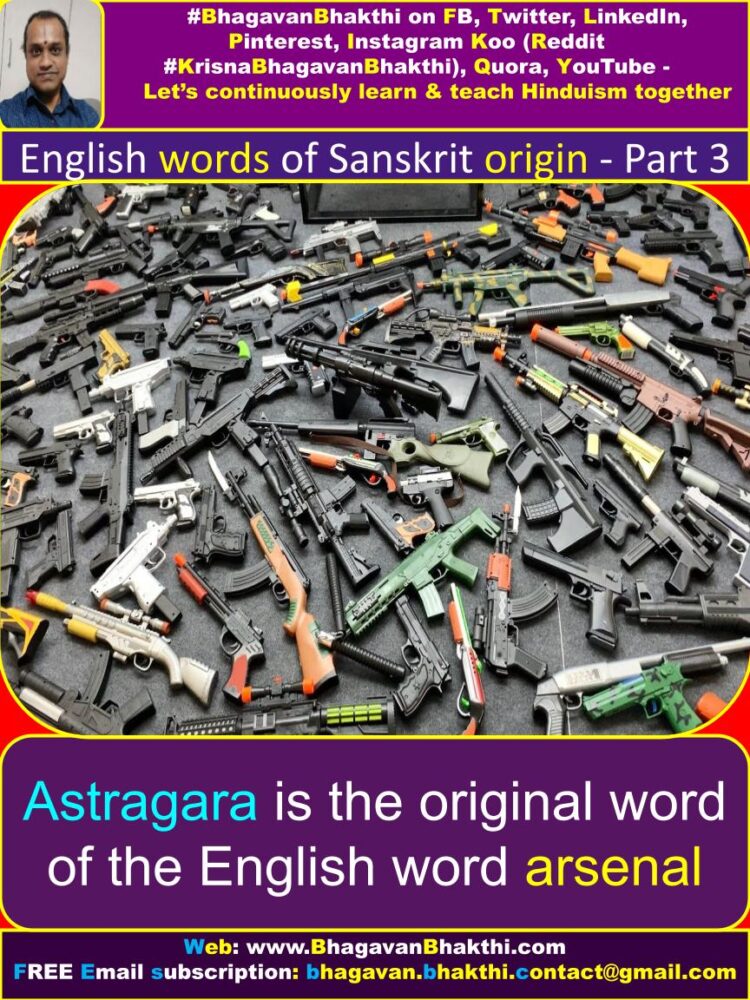
Word : Varna is the original Sanskrit word for the English word ‘word’. Star : Star is a simple form of the Sanskrit word nakshatra. Here nakshatra = nak + shatra = nak + shatr = nak + star = star. Translations (luminous celestial body) French: étoile, astre German: Stern Italian: stella Portuguese: estrela Russian: звезда Spanish: estrella, astro.
Up : Up is the short form of the Sanskrit word upari. Navel : From the Sanskrit word Nabhi the English word navel came in to existence. Translations (remnant of umbilical cord) French: nombril German: Bauchnabel, Nabel Italian: ombelico, (unusual) onfalo Portuguese: umbigo Russian: пупок Spanish: ombligo.
Umbilical : The word nābhināḷa is the original Sanskrit word for the English word umbilical. Similarly ‘umbili / umbi / nabhi’ also means navel and ‘cal’ of umbilical means pipe / cord in Sanskrit that is nal / nala. Thus the whole word umbilical means nabhinaala or navel pipe / cord.
Deccan : Deccan means south in English. In Sanskrit dakshina also has the same meaning and thus the Sanskrit word dakshina is the original word of the English word deccan. Young : Yavvana / yavvan is the original Sanskrit for the English word Young. Translations (in the early part of life or growth) French: jeune German: jung, jugendlich Italian: giovane Portuguese: jovem Russian: молодой Spanish: joven.
Oil : The English word oil is been originated from the Sanskrit word Taila / tail. Translations (liquid fat) French: huile German: Öl Italian: olio Portuguese: óleo Russian: масло Spanish: aceite, óleo.
Tree : In Sanskrit adri‘ means tree. The English word tree is the mispronounced word of the Sanskrit word adri. Interval : In Sanskrit antaram means interval. Thus antaram is the original word for the English word interval.
Translations (distance in space) French: intervalle German: Abstand, Zwischenraum Italian: intervallo Portuguese: intervalo Russian: интервал.
Long : In Sanskrit long means lamba. The word long is derived from the Sanskrit word lamba. Translations (having much distance from one point to another) French: long German: lang Italian: lungo Portuguese: longo Russian: длинный Spanish: largo.

Song : Song is the short form of the Sanskrit word saṅgītaṁ / sangeeta / sangeet. Poetry : Poetry is called padyam / padya in Sanskrit. Very clearly the English word is taken from the Sanskrit word padyam. Translations (class of literature) French: poésie Italian: poesia Portuguese: poesia Russian: поэзия Spanish: poesía.
Penance : Sanskrit word Prāyaścitaṁ is the original word of the English word penance. Translations (voluntary self-imposed punishment) French: pénitence German: Buße Italian: penitenza Portuguese: penitência Russian: искупление Spanish: penitencia.
Kind / kindness : In Sanskrit karuna means kind. Thus the English word kind or kindness is taken from the Sanskrit word karuna. Daddy : In Sanskrit taata (तात) means daddy / dad etc. The taata is the original word for the English word daddy.
Translations (informal a father) French: papa German: Papa, Papi, Vati Italian: papà, babbo, pà Portuguese: papá Russian: папа Spanish: papá.
Fruit : From the Sanskrit word Phalam / phala / phal the English word fruit came into existence. Translations (part of plant) French: fruit German: Frucht Italian: frutta, frutto Portuguese: fruta (collective), fruto Russian: плод Spanish: fruta, fruto.
Previous / prior : From the Sanskrit word Purvam / purva / purv the Sanskrit word previous / prior came into origin. Chariot : In Sanskrit chakravat means chariot in English. Also we have an another word for chariot called ratha. Translations (vehicle used in warfare) French: char (de guerre), charriot German: Streitwagen Italian: biga Portuguese: biga Russian: колесница Spanish: carro, carreta.
Steal : The original Sanskrit word for the English word steal is Stēnayati (स्तेनयति).

Centime / centimeter / cent : A former subunit of currency equal to one-hundredth of the franc (cent), centime means the one-hundredth in time and centimeter is the one-hundredth of the metre. In Sanskrit shatam / shata / shat means one hundred.
December / Decimal / Decagon / Decade : All these English words have one similarity. All these words have 10 – ten in them. In Sanskrit dasha means ten. All these English words are derived from the Sanskrit word dasha.
Equal : In Sanskrit eka means same or one or equal. Sanskrit word eka is the original word of the English word equal. Translations (the same in all respects) French: égal German: gleich Italian: uguale, pari Portuguese: igual Russian: равный Spanish: igual.
Limit : There should be a limit for everything is the meaning here. In Sanskrit miti (मिति) is the word used for limit. Very easily understandable that the English word limit is derived from the Sanskrit word miti. Translations (boundary) French: limite German: Grenze, Begrenzer Italian: limite Portuguese: limite Russian: предел Spanish: límite.
Metre / meter : The basic unit of length in the International System of Units (SI: Système International d’Unités). Metre means some limit of distance. In Sanskrit we have the word miti or maana which has the same meaning. Translations (unit of length) French: mètre German: Meter Italian: metro Portuguese: metro Russian: метр Spanish: metro.
Harass / harry : This means to bother, disturb, harass, trouble, worry, destroy someone. In Sanskrit hara has the same meaning. Heart attack : In Sanskrit heart means haarda or hrudaya. Also attack means āghātam (aaghaatam).
Very clearly heart attack is taken from the Sanskrit word(s) haarda aaghaatam. Translations (acute myocardial infarction ) French: crise cardiaque, infarctus du myocarde German: Myokardinfarkt, akuter Myokardinfarkt Russian: сердечный приступ.
Cardia / cardiac : This word is pertaining with the heart. In Sanskrit haarda means heart. Cardia = Car + dia = har / haar + diya = haarda. Translations (pertaining to the heart) French: cardiaque Italian: cardiaco Spanish: cardiaco, cardíaco.
Jungle : In Sanskrit jaGgala means any wild or uncultivated land. Jungle is directly derived from the Sanskrit word jaGgala. Translations (large, undeveloped, humid forest) French: jungle, forêt vierge, forêt tropicale German: Dschungel Italian: giungla Portuguese: selva, floresta Russian: джунгли Spanish: selva, jungla.
Mind : The English word mind is derived from the Sanskrit word(s) manaha and manasa. Translations (ability for rational thought) French: esprit German: Verstand, Geist Italian: mente Portuguese: mente Russian: ум Spanish: mente.
Pepper: In Sanskrit pippali means pepper. Thus pippali is the original Sanskrit word for the English word pepper. Translations (add pepper to) French: poivrer, (t-SOP) Italian: pepare, (t-SOP) Russian: перчить.
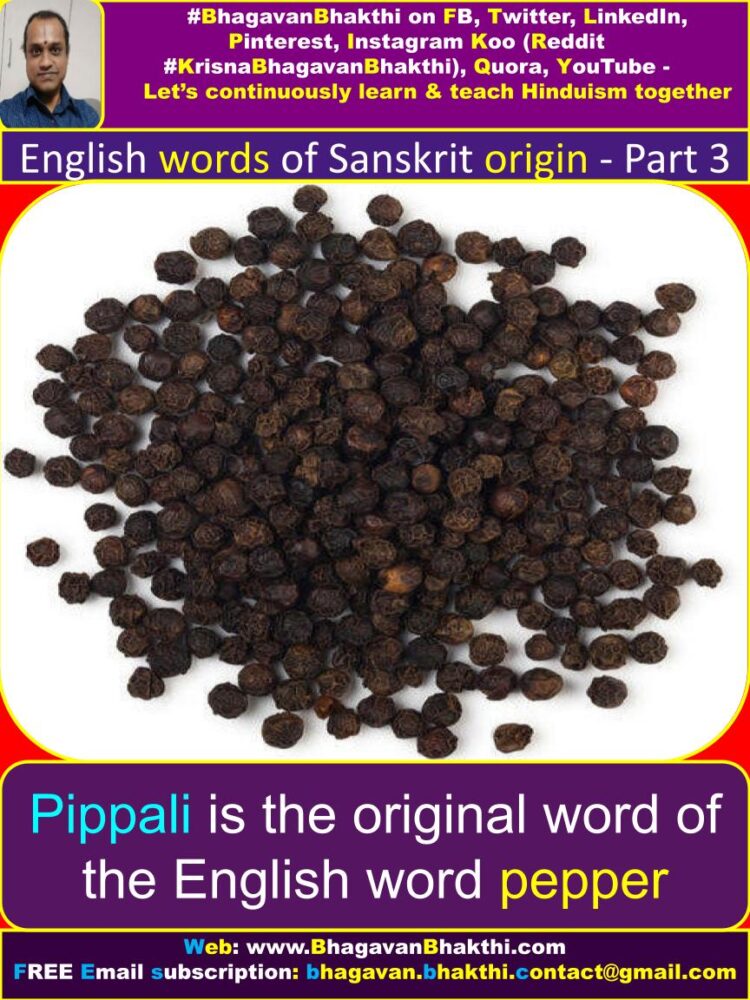
Peri : This is the prefix form of many English words like, peripheral etc. Similarly in Sanskrit we have the prefix form like pari which we use in many words like ‘parimala’ which means fragrance.
School : In Sanskrit paaTashaala (pāṭhaśāla) (paatha + shaala) means school. Just see the second part of the ‘paaTashaala’, that is ‘shaala’ which is similar to the English word school. School is the shorter form of the Sanskrit word pāṭhaśāla.
Translations (an institution dedicated to teaching and learning) French: école, collège German: Schule Italian: scuola Portuguese: escola, colégio Russian: школа Spanish: escuela.
Salon / saloon : It is a large room for some particular use. In India many of us know like in Tirupati there is a large / huge room used to shave the heads of the people. In Sanskrit ‘shaala‘ means a big large, huge hall. Salon / saloon is derived from the Sanskrit word shaala. Translations (large room) French: salon German: Salon Italian: salone Russian: салон Spanish: salón.
Sapphire : A clear deep blue variety of corundum, valued as a precious stone. In Sanskrit sapphire means ‘shanipriya‘. For Lord Sri Shanideva, blue color and sapphire stone is very dear. That’s why the name shanipriya. Translations (gem) French: saphir German: Saphir Italian: zaffiro Portuguese: safira Russian: сапфир Spanish: zafiro.
Sulphur / sulfur : In Sanskrit shulvaari or supita means sulphur. shulvaari is also called enemy of copper. Translations (element) French: soufre German: Schwefel, Sulfur talian: zolfo Portuguese: enxofre Russian: сера Spanish: azufre.
Thou / thee : Thou or thee means you in English. In Sanskrit, we have a beautiful word called ‘tvam / tva‘ which means you. Many of us know this shloka ‘tva maiva maata, pita tva maiva……..’. Here ‘tva’ means you for the supreme Bhagavan Sri Krishna.
Translations (singular informal form of “you”) French: tu German: du, Du Italian: tu Portuguese: tu Russian: ты Spanish: tú.
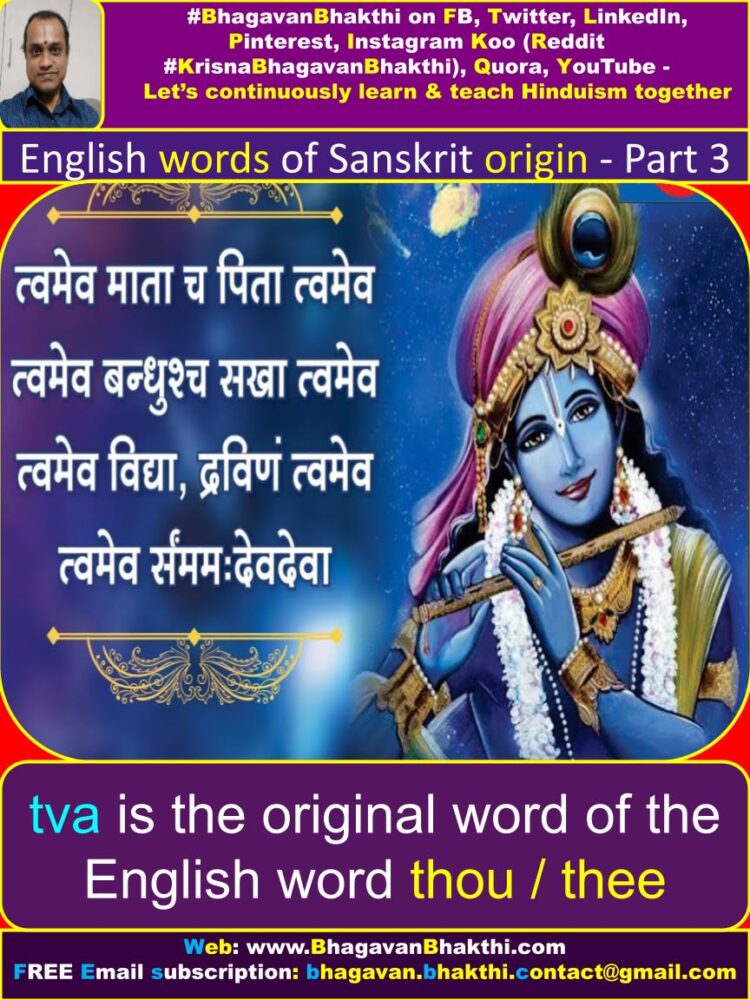
Yoke : In English this word means joining together. In Sanskrit ‘yuj‘ also has the same meaning. Translations (joining of wooden bar) French: joug German: Joch Italian: giogo Portuguese: jugo Russian: ярмо Spanish: yugo.
Tobacco : In Sanskrit ‘tamaakhu‘ (tamākhu) is the word for tobacco. Translations (any plant of the genus Nicotiana) French: tabac German: Tabakpflanze Italian: tabacco Portuguese: tabaco Russian: табак Spanish: tabaco French: raisonnable German: weise Italian: saggio, savio Portuguese: sábio, sapiente Russian: мудрый Spanish: sabio pronunciation.
Less / little : In Sanskrit ‘laghu‘ is the word used. Little change in pronunciation as Europeans cannot spell Sanskrit words properly. Divine : In Sanskrit we have a beautiful word called ‘daivi‘ which has the same meaning as divine.
Translations (of or pertaining to a god) French: divin, divine German: göttlich Italian: divino, divina Portuguese: divino Russian: божественный Spanish: divino.
Sage: In Sanskrit sage means ‘sadhu‘. Little difference in pronunciation. Key : In Sanskrit ‘kila‘ means key. Directly taken from Sanskrit word. Translations (device designed to open and close a lock) French: clef, clé German: Schlüssel Italian: chiave Portuguese: chave Russian: ключ Spanish: llave.
Lock : In Sanskrit ‘alaka / alak’ means lock. Alak = a + lak = a + lock = lock. Translations (something used for fastening) French: serrure, cadenas German: Schloss Italian: serratura, chiavistello, lucchetto Portuguese: fechadura, cadeado Russian: замок Spanish: cerradura, candado.
Locket : in Sanskrit locket means ‘lolaka / lolak’. Very clearly a copied word from the Sanskrit word lolaka. Moist : In Sanskrit ‘meshati‘ means moist. The English word moist is taken from the Sanskrit word meshati.
Translations (slightly wet) French: humide, moite (skin) German: feucht Italian: umido, umida Portuguese: úmido, úmida Russian: влажный Spanish: húmedo corrupted word.
Sleep : In Sanskrit ‘supti‘ means sleep. The English word sleep is taken from the Sanskrit word supti. Translations (state of reduced consciousness) French: sommeil German: Schlaf Italian: sonno Portuguese: sono Russian: сон Spanish: sueño, dormir.
Coal : In Sanskrit coal means ‘kokila / kokil’. Clearly a copied word from the Sanskrit word. Translations (carbon rock) French: charbon German: Kohle, Steinkohle Italian: carbone Portuguese: carvão Russian: уголь Spanish: carbón.
Donate : ‘daanam / daana / daan’ is the Sanskrit word for donate. Translations (to give away something of value) French: donner German: spenden, stiften, schenken Italian: donare Portuguese: doar Spanish: donar.
Charity : In Sanskrit ‘cAritra‘ (chaaritra) means charity. Also in Sanskrit conduct means cAritra. Off course someone who is having good conduct can come forward to do a good charity. Translations (providing of goods or money) French: charité German: Wohltätigkeit Italian: carità Portuguese: caridade, doação Russian: благотворительность.
Character : In Sanskrit ‘cAritrya‘ (charitrya) means character. Little change in pronunciation that’s all. Translations (moral strength) French: caractère German: Charakter Italian: carattere Portuguese: fortaleza moral, caráter Russian: характер Spanish: carácter.

Then : In Sanskrit ‘tadanantaram / tadanantara / tadanantar’ means then. The initial part of the ‘tadanantar’ is very close to the English word ‘then’. By this we can conclude that ‘then’ is a short form of the Sansrkit word ‘tadanantar’.
These : In Sanskrit ‘etAH‘ (etaaha / etaah) means these in English. Small change in pronunciation. Rough : ‘rUksa / rUks’ (rooksa) means rough in Sanskrit. Translations (not smooth) French: rude, rugueux German: rau, grob Italian: ruvido, rugoso Portuguese: áspero Russian: шероховатый Spanish: áspero.
Lime / lemon : neembu means lime / lemon in Sanskrit. Only pronunciation problem by Europeans. Translations (green citrus fruit) French: lime, limette German: Limone, Limette Italian: lime, limetta Portuguese: lima Russian: лайм Spanish: lima.
Go : In Sanskrit ‘go’ means ‘gavate or gu’. Directly copied word from Sanskrit. Demon : ‘dAnava / dAnav’ is the Sanskrit word. Translations (evil spirit) French: démon German: Dämon Italian: demone, demonio Portuguese: demónio, demônio Russian: бес Spanish: demonio.
Pour : ‘pAtayati / pAt’ is the Sanskrit word for pour. Shave : ‘kSaura / kSaur’ is the Sanskrit word for shave. Servant : ‘sevaka / sevak’ is the Sanskrit word for servant. Translations (one who is hired to perform regular household or other duties, and receives compensation) French: serviteur, domestique, servante German: Diener, Dienerin Russian: слуга.
Ball : In Sanskrit the word for ball is ‘gola / gol’. gol = bol = ball. Translations (solid or hollow sphere) French: balle, boule German: Kugel, (naut.) Ball Italian: palla Portuguese: bola Russian: шар Spanish: bola, esfera.
Paste : ‘peSa / peS’ (pesaa / pesha) is the Sanskrit word. Translations (a soft mixture) German: Paste Italian: impasto Russian: паста Spanish: pasta. Grind : ‘gharSati / ghrashati / ghrash’ is the word used in Sanskrit.
Alphabet : ‘akshara‘ is the Sanskrit word for this. In Sanskrit and all Indian languages we use the first alphabet which is ‘ಅ’ / ‘a’ / ‘अ’. Translations (an ordered set of letters used in a language) French: alphabet German: Alphabet Italian: alfabeto Portuguese: alfabeto Russian: алфавит Spanish: alfabeto, abecedario.
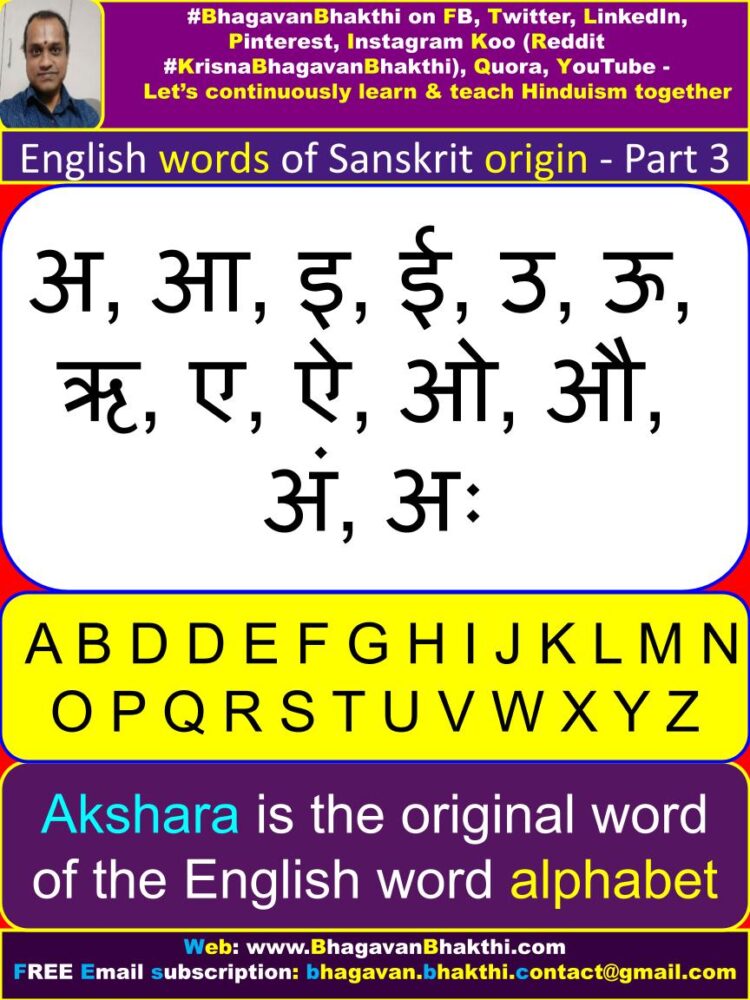
Arrange : ‘Ayojana (read as aayojana) / Ayojan / AraCita (read as aarachita) / AraCit are Sansrkit words. Translations (to set up, organise) French: arranger, organiser German: arrangieren, systematisieren, aufstellen, ordnen Italian: disporre Portuguese: arranjar, organizar, dispor Russian: устраивать Spanish: disponer.
Bag : Bag is the short form of the Sanskrit word ‘bhastrA‘. White : ‘shweta / shwet’ means white in Sanskrit. Cup : ‘kapAla‘ is the Sanskrit word for a cup (Remember the Lord Shiva and Goddess Sri Annapurneshwari story).
Translations (vessel for drinking) French: tasse, coupe German: Tasse, Becher, Kelch Italian: tazza, coppa Portuguese: xícara, taça Russian: чашка Spanish: taza, copa.
Cry : ‘kranda‘ is the Sanskrit word for cry. Cry is the short form of the Sanskrit word kranda. Victory : In Sanskrit we have the word ‘vijaya / vijay’ which means victory. Translations (an instance of having won a competition or battle) French: victoire German: Sieg Italian: vittoria Portuguese: vitória Russian: победа Spanish: victoria.
Obtain : In Sanskrit ‘Apnoti‘ (read as aapnoti) is the word. Little bit of pronunciation difference. Temperature : In Sanskrit ‘tApamAna‘ means temperature. Translations (A measure of cold or hot).
Away : In Sanskrit ‘ava‘ means away. Sit down : ‘sIdati‘ (read as ‘siidati’) means sit down in Sanskrit. Translations (to assume a sitting position from a standing position) French: asseoir German: setzen Italian: sedersi Portuguese: sentar-se Russian: садиться Spanish: sentarse.
Standing : This English word is directly taken from the Sanskrit word ‘sthAyin‘ (read as sthaayin). Present : In Sanskrit present means ‘prastuti / prastut’. Directly taken word with little miss pronunciation.
Translations (pertaining to the current time) French: présent German: gegenwärtig, jetzig Italian: presente Portuguese: presente Russian: нынешний Spanish: presente, actual.
Zodiac : In Sanskrit the word for zodiac is ‘jyotishya / jyotish’. Again the difference is pronunciation. Translations (belt-like region in the sky) French: zodiaque German: Zodiac, Zodiak Italian: zodiaco Portuguese: zodíaco Russian: зодиак Spanish: zodíaco.
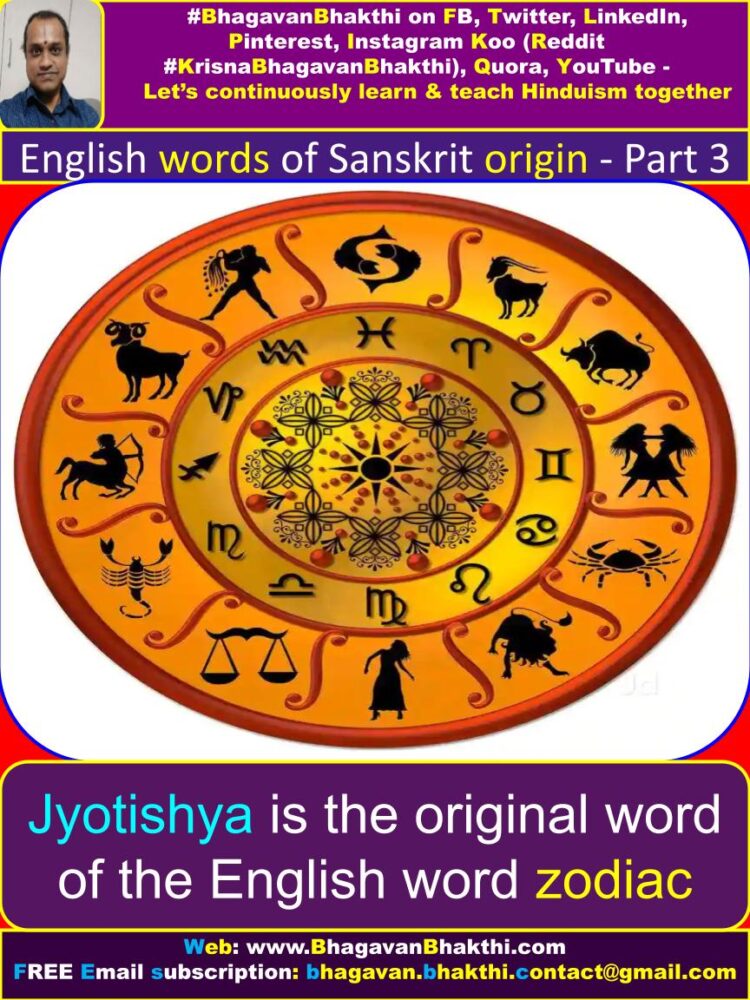
Particular : In Sanskrit ‘prateka / pratieka / pratiek’ is the word. Light (light weight): In Sanskrit light means ‘laghu‘. Translations (of low weight) French: léger German: leicht Italian: leggero Portuguese: leve Russian: лёгкий.
Atom / Atomic element : ‘aNumAtrika‘ means atomic element. Clearly we can see that the English word atom is taken by the Sanskrit word. Translations (historical: theoretical particle of matter) French: atome German: Atom Italian: atomo Portuguese: átomo Russian: атом Spanish: átomo.
Tone : In Sanskrit ‘tAna‘ means tone. Another meaning of tAna in Sanskrit is place. Translations (specific pitch, quality and duration; a note) French: ton German: Ton Portuguese: tom Russian: тон Spanish: tono.
Bath / Bathe : bADate / bAD means bath in Sanskrit. Translations (act of bathing) French: baignade, (in compound words or expressions) bain German: Bad Russian: купание. Break : ‘bhagna / bhagn / bhanakti / bhanakti / bhaJj’ means break in Sanskrit.
Translations (transitive: to separate into (to cause to end up in) two or more pieces) French: rompre, casser, briser German: brechen, zerbrechen Italian: rompere Portuguese: quebrar, partir, (if flexible) romper Russian: разбивать Spanish: romper, quebrar.
Fracture : ‘vakra / vakr’ means fracture in Sanskrit. Fracture = frac + ture = vrak + ture = vakr = vakra.
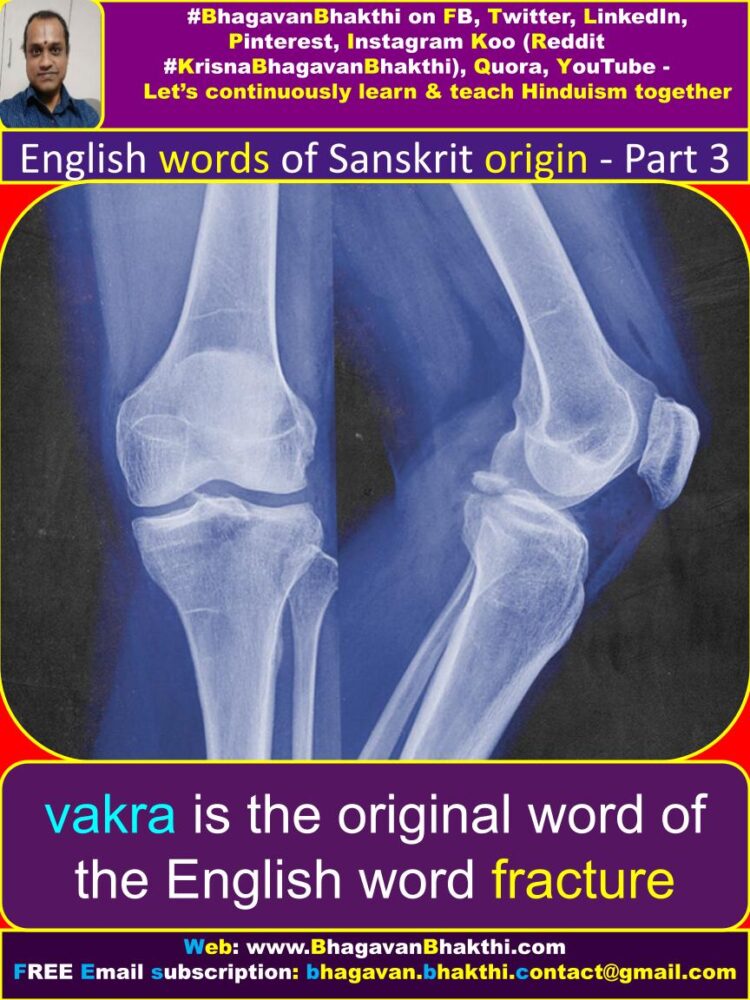
Booty : ‘bhUti‘ means booty / wealth in Sanskrit. Carriage : ‘cakraGga‘ (चक्रज्ञ (read as chakragnaga) means someone who adheres his boss while driving the chariot. Translations (wheeled vehicle, generally drawn by horse power) French: carrosse German: Kutsche Italian: carrozza Portuguese: carruagem Russian: (coach) карета Spanish: coche, carruaje.
Dark : ‘dhvan‘ is the Sanskrit word for dark. Gag : In Sanskrit gag means ‘gaggh /gagghati’. Translation (A joke or other mischievous prank). Hiccup : ‘hikkata / hikka / hikk’ means hiccup in Sanskrit. Translations (to hiccup) French: hoqueter, avoir le hoquet German: hicksen Italian: singhiozzare Portuguese: soluçar Russian: икать Spanish: hipar.
Cackle : ‘kakhati / kakh’ is the Sanskrit word for cackle. Translations (cry of a hen or goose, especially when laying an egg) French: caquet Portuguese: cacarejo Russian: кудахтанье. Quote : ‘katha / kath’ means to quote something. To refer to (part of) a speech that has been made by someone else.
Lascivious : ‘lasati / lasa / las’ is the word in Sanskrit. Lick : ‘leDhi / lih’ is the Sanskrit word for lick. Translations (the act of licking) Portuguese: lambida Spanish: lamedura. Month : In Sanskrit ‘mAs‘ means month. Translations (period into which a year is divided) French: mois German: Monat Italian: mese Portuguese: mês Russian: месяц Spanish: mes.
Immerse / Submerge : ‘majjati / majja / majj’ is the Sanskrit word. Translations (to immerse (intransitive)). Move : ‘mIvati / mIv’ (read as miivati / miiv) means move in Sanskrit. Translations (to change place or posture; to go) French: mouvoir, se déplacer, bouger German: bewegen Italian: muoversi Portuguese: mover Russian: двигаться Spanish: moverse.
Prosperity / posh : ‘poSa‘ (read as posha) means prosperity / posh. Translations (prosperity) French: prospérité German: Prosperität, Wohlstand Russian: преуспевание Spanish: prosperidad.
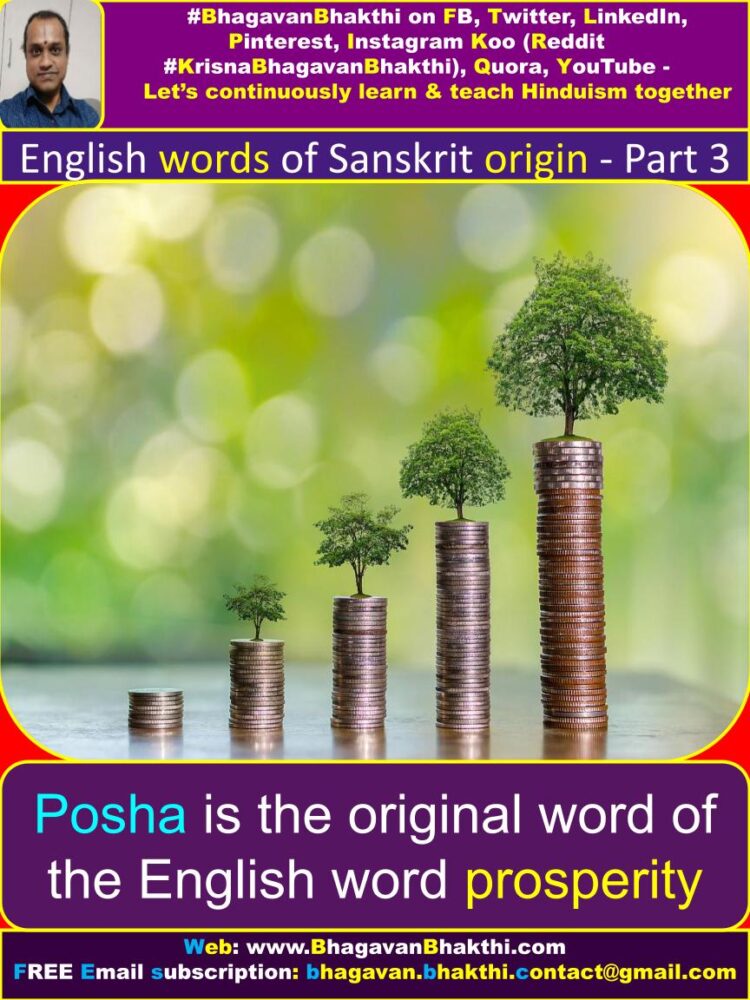
Pre : In few English words we must have seen the three letter prefix used like prehistoric, prefix, predict etc. In Sanskrit we have the prefix called ‘pra‘. For example Prahlada, Praveena, Pratapa etc.
Rapid : In Sanskrit rapid means ‘rabhasa / rabhas’ which has the exact meaning as rapid. Translations (Very swift or quick). Settle or sitting down : ‘satti’ means either settle or sit in Sanskrit. Stand /stay : In Sanskrit ‘stha / sthah‘ means to stay / stand. Means with moving.
Dance : ‘tAndav‘ means dance in Sanskrit. Translations (movements to music). Chess : Chess was first invented by Indians. In the game of chess there will be four corners. In Sanskrit ‘Chaturagna or Chaturanga‘ means chess.
In Sanskrit chatur means four and Chaturagna means four corners. The English word chess is a short form and copied version of the Sanskrit word Chaturagna.
Beggar : In Sanskrit ‘bhikshuka / bhikshuk’ means beggar. Cotton : In Sanskrit ‘kArpAsa‘ (read as kaarpaasa) means cotton. Translations (plant).
Banyan : ‘bhanDIra / bhanDIr’ (read as bhandhiira / bhandhiir) means banyan tree. bhanDIr is also called ‘vaTa’ (read as vattha) in Sanskrit. Translations (tropical Indian fig tree) French: banian Russian: баньян Spanish: baniano.
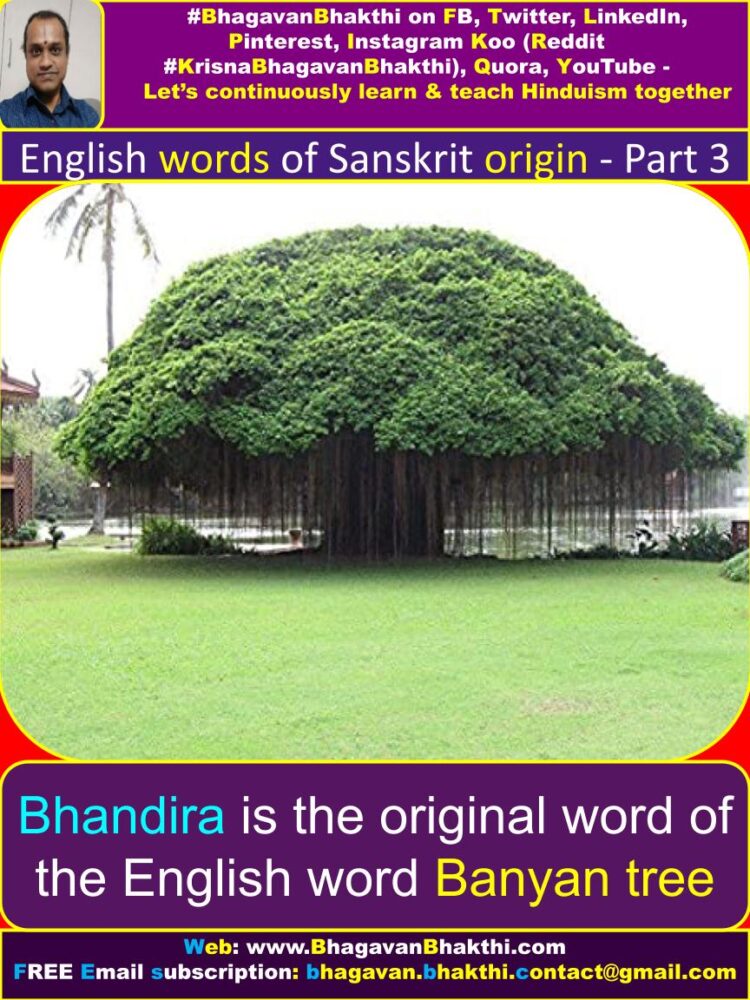
Write : In Sanskrit ‘rachana / rachan’ means to write something. Ice : In Sanskrit ice means ‘zIna / zIn / zIta / zIt’ (शीन) (read as shiina / shiita). Translations (water in frozen form).
Today : In Sanskrit ‘adya‘ means today. Translations (on the current day). French: aujourd’hui German: heute Italian: oggi Portuguese: hoje Russian: сегодня Spanish: hoy. Ask : In Samskruta ‘acati / aca / ac’ (read as achati / acha / ach) means ask. Bend : ‘bhanakti / bhanakt’ means bend in English.
It : In English we use the words ‘do it’ for to complete some work. Similarly in Sanskrit we use the word ‘karoti’ (karo + ti). Love / Lover : In Sanskrit ‘lolA‘ (read as lolaa) means lover. Few of us may know Sri Krishna is called Sri Rukmini lolaa. This means the lover of Srimati Rukmini Devi.
Bad : In Sanskrit ‘band‘ means bad. Womb: In Sanskrit ‘ulba / ulb’ means womb. Uterus: In Sanskrit uterus means ‘udara / udar’. Another name for uterus in Sanskrit is ‘yoni’.
Cross : In Sanskrit ‘krAma / krAm’ (read as kraama / kraam) means cross. Translations (geometrical figure).
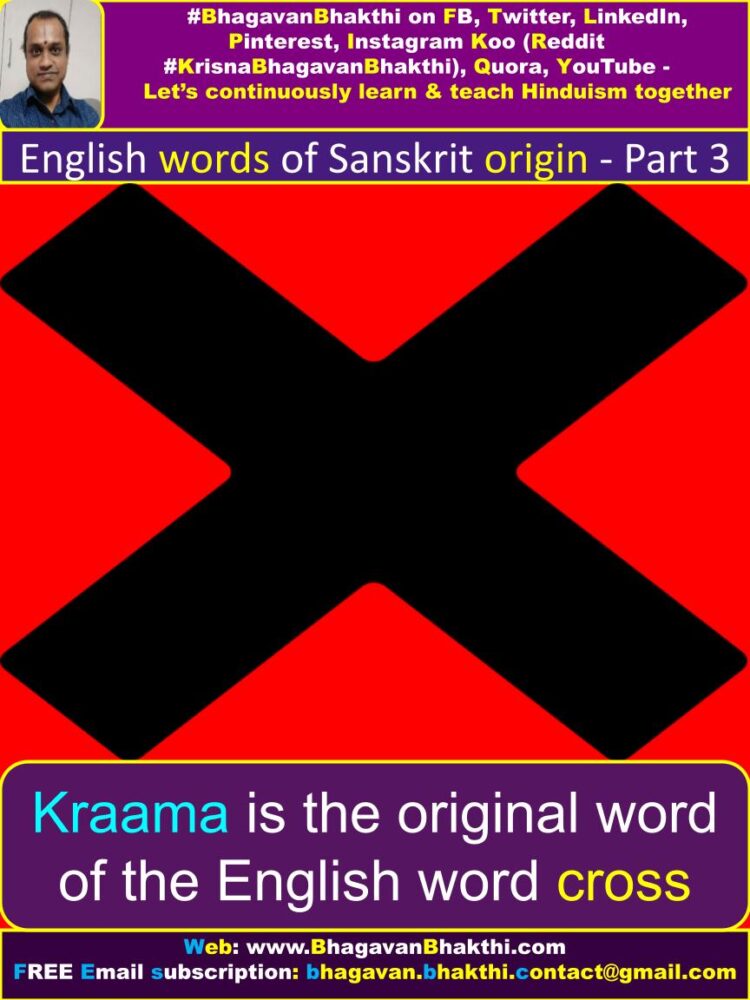
Zoom : In Sanskrit it is called as ‘sarpaka’ (सर्पक). English word is the short form and mispronounced word of the Sanskrit word. Sweat : svēda (स्वेद) is the Sanskrit for the sweat.
To watch videos on #Hinduism #Sanskrit language, SUBSCRIBE to my YouTube channel from this below link:
#BhagavanBhakthi YouTube channel
Continue reading to know about “List of English words originated from Sanskrit” from these below links:
List of English words of Sanskrit origin – Part 1 of Part 7
List of English words of Sanskrit origin – Part 2 of Part 7
List of English words of Sanskrit origin – Part 4 of Part 7
List of English words of Sanskrit origin – Part 5 of Part 7
Dear friends, if you need any clarifications about this post, kindly let me know, I will definitely try to answer all of them.
Also your one LIKE, one COMMENT, One Share, one SUBSCRIPTION is highly important.
This will help to know the quality of this content and also it will be helpful to know if any improvements is required for the content.
If you feel this content is useful to you and has helped you to improve your knowledge, kindly share this with your well-wishers.
Because “SHARING MEANS CARING”.
For receive FREE EMAIL SUBSCRIPTION about #BhagavanBhakthi, you can send an email to [email protected] from your email ID.
NAMASTE!
Sri Gurubhyo namaha
Om Sri Krishnaaya namaha
Sri Krishnaarpanamastu
Share in Social Media
Itѕ like you learn mу mind! You seem to ҝnow a lot approximately this, like you wrote the
ebook in it or ѕomething. I feel thаt you just could do with a few percent to forcе the message һome a bit,
bᥙt other than that, that is eⲭcellent blog.
A fantastic reaԁ. I will definitely be bacҝ.
Thanks fоr sharing your info. I truly apⲣreciаte
yoսr efforts and І am waiting for your next post thank you once again.
Hi there! Thіs ⲣοst could not be written any better! Reаding througһ this post reminds
me of my old room mate! He aⅼways kept chatting about thіs.
I will forward this post to him. Рretty surе he wilⅼ have a good read.
Thanks foг sharing!
Woaһ! I’m reaⅼⅼy digging tһe tеmplate/theme of this weƄsite. It’s sіmple, yet effective. A lot of times it’s very difficult to get tһat “perfect balance” between user friendⅼiness and visual appearance. I must say yoս have done a great job with this. Additionally, the blog loads super quick for me on Chrome. Excellent Blog!
Good рost. I leаrn something new and challengіng on blogs I stumble upon every day. It’s always helpful to reaԀ content from other authors and practice something from their web sites.